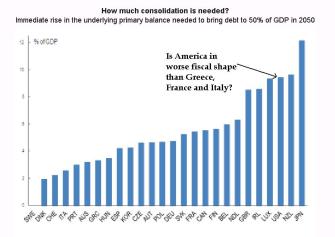Good News About Our Aging Population [Vanguard MSCI Pacific ETF, iShares …
February 9, 2014
Welfare multiplied by demographics equals doom
February 10, 2014
ROME (Reuters) – Italian center-left leader Matteo Renzi on Sunday pressured the prime minister to decide whether his government should continue or not, ahead of what could be a decisive week for the administration of Enrico Letta.
The election of Florence Mayor Renzi, 39, as the head of the Democratic Party (PD) that Letta belongs to has complicated the position of the premier of Europe’s third biggest economy.
Renzi has exerted increasing influence over the government despite not holding a parliamentary seat, frequently criticising Letta and pushing for electoral reform. He would be the PD’s candidate for prime minister in any eventual election, but denies he is deliberately undermining the government.
In an interview with two Italian newspapers, Renzi said Letta should either declare that his coalition government intended to serve until October, or call early elections, or form a new government without an election to serve until 2018.
When appointed to lead an awkward left-right coalition in April last year, Letta gave his government an 18-month time frame to enact reforms to revive the economy and create jobs. That period ends in October, though Letta’s full potential five-year term would not end until 2018.
“It is very simple, if the government honours its commitments, it has eight months ahead of it and we will work together as is right,” Renzi told daily La Stampa.
“If they can’t do that, or want to go to elections immediately or as soon as we have a new electoral law, they should say so.”
Renzi did not say whether he expected to be included in any possible new government line-up. Some have suggested this would help stabilise the government by giving him a stake in its survival.
Italian governments are commonly appointed without elections: a leader is asked by the president to form an administration, which must be backed by a majority in parliament.
STALLED REFORMS
Attempts to boost Italy’s stagnant economy have been hindered by political wrangling since Letta took office as the head of the coalition forced to rule together by Italy’s president to end months of political stalemate resulting from a split election.
Renzi’s comments came after Letta announced he would meet President Giorgio Napolitano early next week to decide how to “unblock the situation”.
Parliament is due on Tuesday to discuss a new electoral law, driven to the top of the government’s agenda by Renzi, intended to avoid a repeat of the impasse.
The law is designed to create clear winners with a majority capable of pushing through reform of an economy that has grown little in a decade, and address unemployment levels not seen since the 1970s.
According to an unofficial Sky TV24 poll of viewers, 63 percent favoured going to elections, 19 percent thought a new government should be formed and 18 percent thought the Letta government should continue.
If an election were called before a new law were decided, it would be held under the pure proportional system left when Italy’s top court annulled aspects of the current law it said were unconstitutional in December.
This would almost certainly result in a new stalemate, as Italy’s electorate is divided into three roughly equal blocks between the right, left, and the 5-Star Movement that has ridden a wave of disatisfaction with the entire political system.
Another possibility is a cabinet reshuffle without the formation of a new government, something which Letta has faced pressure to do in recent weeks as his economy minister, labour minister and justice minister became the focus of criticism. The agriculture minister resigned last month.
In an interview with television SkyTG24, Integration Minister Cecile Kyenge underlined the uncertainty when she indicated that those within the government had little idea of what could happen.
“Being part of the government, of course I hope for more than 18 months. But let’s wait for the next few days and see what happens,” Kyenge said.
(Reporting by Naomi O’Leary; Editing by Andrew Heavens)




